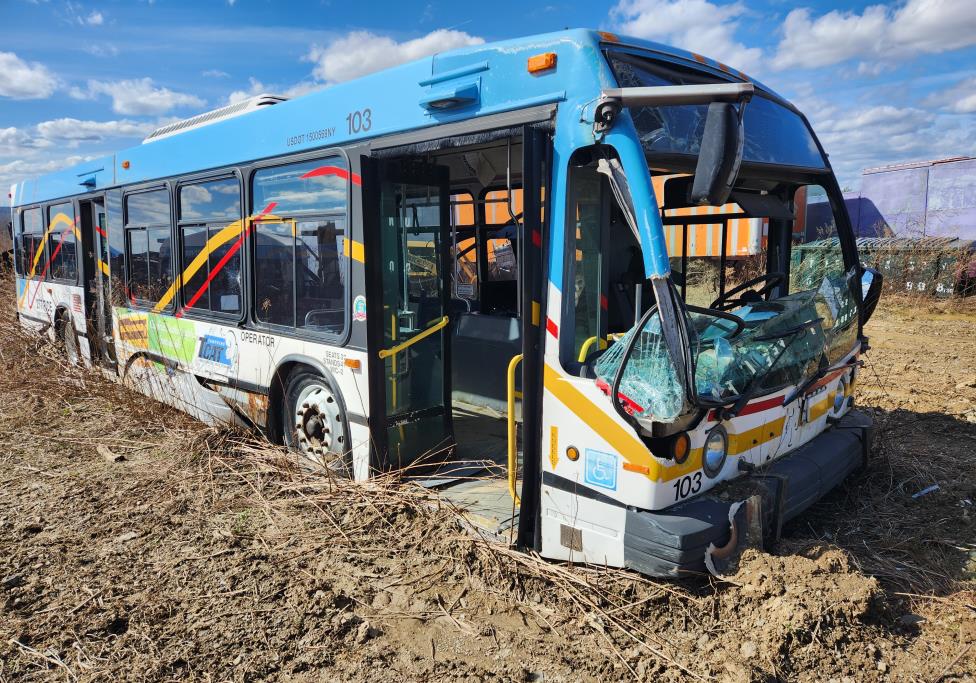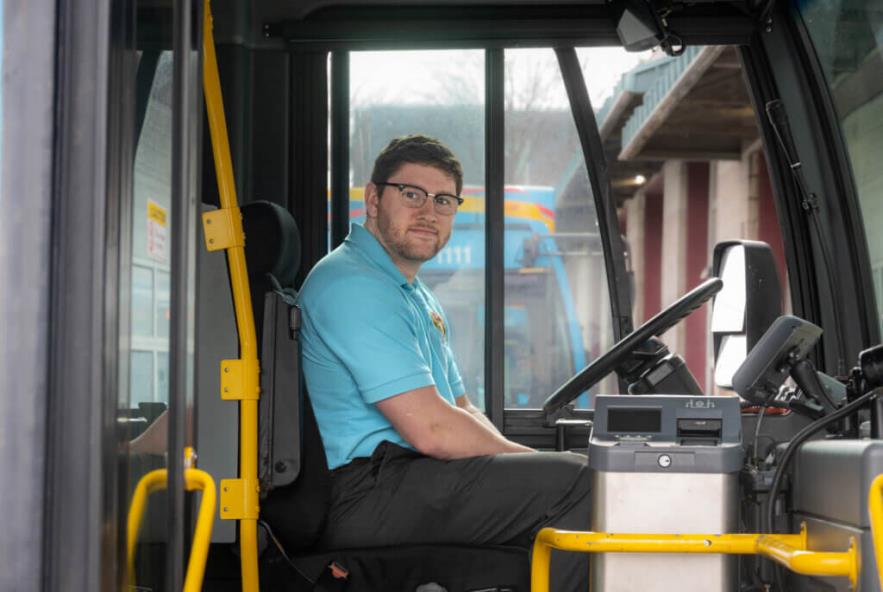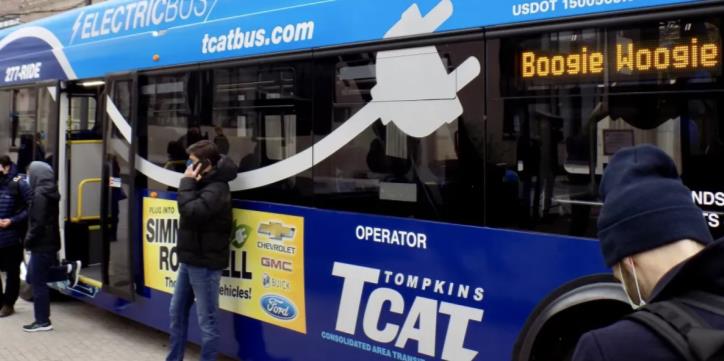Plethora of problems idle all TCAT Electric Buses
by Robert Lynch; March 16, 2024

The electric transit bus may be an innovation whose time has not yet arrived, providing that time will ever come. Judging from this years’ experience at TCAT, that suspicion has quickly become local reality. What’s come off the assembly line simply hasn’t passed the “smoke test” of day-to-day use. And what’s just happened underscores the point.
Tompkins Consolidated Area Transit (TCAT) has seven electric buses in its fleet. All are relatively new. Each was manufactured by the now-bankrupt firm, Proterra. And since the night of March 13th, all seven of those buses have been out-of-service, kept idled at the TCAT garage due to problems ranging from failed batteries to worries about structural safety.
“On Wednesday evening, March 13, staff noticed a serious issue affecting the frame on one of the Proterra buses,” Patty Poist, TCAT’s Manager of Communications and Marketing, stated in a Friday evening email, her statement made in response to this writer’s inquiry.
Poist continued, “Acting General Manager Matthew Rosenbloom-Jones made the immediate decision to remove all seven Proterra buses from service until further notice. We do not yet know if this is a structural issue that may cause similar problems with the other six buses, but safety is paramount.”
“TCAT will not bring these vehicles back into service until we have been provided a definitive fix from Proterra that fully satisfies TCAT staff as well as our regulatory partners at NYSDOT,” Acting GM Rosenbloom-Jones” was quoted by Poist.

What’s happened since Rosenbloom-Jones assumed his interim leadership post at the local transit agency earlier this month bears sharp contrast to the pro-electric futuristic enthusiasm that dominated TCAT’s public statements during the tenure of TCAT’s former General Manager, Scot Vanderpool. TCAT’s leadership was talking then about a total conversion to electrified vehicles, though it would take more than a decade to accomplish. Green-friendly, plugged-in buses were seen as the future TCAT wanted to take the lead to embrace.
But the new reality—even before the frame-safety issue arose this week—tempered the comments of Vanderpool’s interim successor at a Monday meeting of the TCAT Riders Advisory and Accessibility Committee.
TCAT will maintain “a mix of electric and diesel (buses) for the indefinite future,” Rosenbloom-Jones told the advisory committee. In his opinion, as to electrics, “the technology is just not there yet.”
At the time of the March 11th meeting, only two of the seven Proterra buses were then in service. And one of them was on its electrified last legs. Rosenbloom-Jones said one of the pair then still on the road may soon be removed “because one of the batteries is beginning to fail.”
In August of last year, Proterra filed for Chapter 11 bankruptcy. News reports then quoted the California company’s officials as stating that the company “intends to continue to operate in the ordinary course of business.” But of course, that kind of statement from a financially-crippled company goes only as far as it goes.
Electric buses are not cheap. Each of the seven Proterra units, placed on the road beginning in 2021, cost about $1 Million, when the cost of its charger is added in.
TCAT had Uncle Sam’s help in buying those first seven. According to reports, the U.S. Department of Transportation awarded the local transit agency $2.3 Million in 2018 to help enable the seven-bus acquisition. The grant came as part of an $84 Million nationwide appropriation under the federal government’s Low-or No-Emission Grant Program.
According to personnel at Enfield-based Teets and Son Scrap Metal Recycling, where many an old TCAT bus goes to die, Transportation Department rules required each bus diesel bus de-commissioned under the grant program to be cut-up carefully and dismembered to ensure it would never again be on the road.
“Electric buses are the way to go,” Vanderpool said as recently as last July 10th at an Advisory Committee session. He then said TCAT still hoped to adhere to its plans to totally electrify by 2035.
When fully maintained—and bus maintenance has become a chronic problem at the agency—TCAT operates approximately 50 buses in its fleet.
By a November 2023 meeting of the Advisory Committee, Vanderpool began expressing frustration with electric bus maintenance. “It’s been a tough row with parts for these (electric) buses,” the former General Manager admitted. Vanderpool reported that on one day last summer, State Department of Transportation representatives took five buses out of service because their air conditioning systems were not working.
Scot Vanderpool retired as TCAT’s General Manager March first after more than six years with the transit agency and 40 years serving the transit industry. Rosenbloom-Jones was appointed acting GM in late February. He comes to the agency most recently from a transit service in Wisconsin. Since this January, he had been TCAT’s service development manager.

At his first Riders Advisory Committee meeting as Acting GM March 11th, Rosenbloom-Jones referred to electric bus technology as in the “teething” stage. And when asked if Proterra’s bankruptcy stood as the central problem to electric bus maintenance, the Acting GM said manufacturer Proterra’s difficulties are only part of the problem.
“Electric buses are more maintenance-prone,” Rosenbloom-Jones told the committee, TCAT’s new hire echoing his predecessor’s admission of last year. The principal concern? “There’s a battery life problem,” he said.
Not only that, Rosenbloom-Jones acknowledged. There’d been an air-compressor failure on one bus. There have been door problems; sensor problems. In effect, electric buses are maintenance babies. “They’re more problems than with traditional buses,” he said.
And as for the chargers needed to keep those green vehicles running, “Sometimes they work; sometimes they don’t,” Rosenbloom-Jones conceded.
As for the electric bus’s future locally, those earlier-lauded timetables are on hold for now. Full electrification may happen by 2035; but then again, it may not.
“In the wake of our issues with our current fleet and Proterra’s bankruptcy status, we are examining all options on what types of buses we will be purchasing in the future,” Poist stated Friday. “We will keep the community updated when we do make those decisions.”
###

